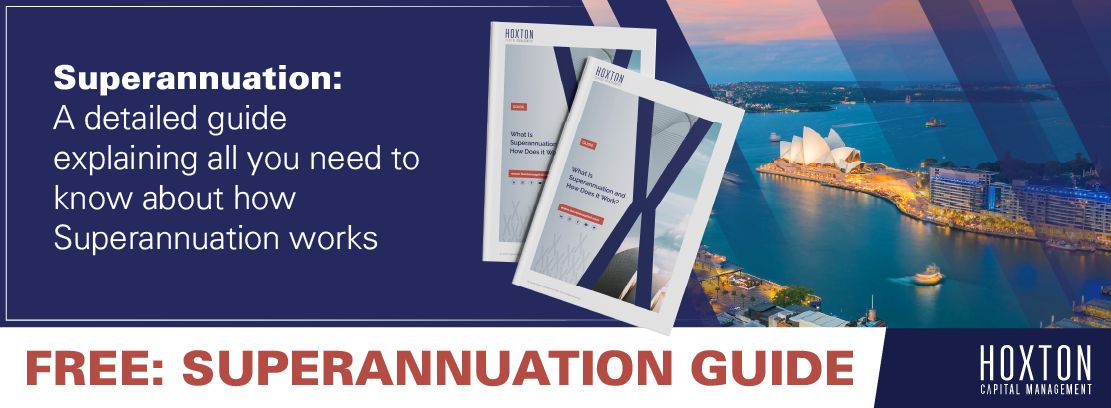How does a Superannuation work?
Superannuation, also known as ‘super’, is a mandatory practice for employed Australians and residents, requiring a portion of your earnings to be allocated to a fund that caters to your financial needs during retirement. Hoxton Capital Management can help you manage and plan for retirement if you have a super. Get in touch. If you are an expat looking to transfer your pension to Australia, read more here. You can download our Superannuation guide for more information.
This page will walk you through the ins and outs of superannuation, helping you understand its:

What is Superannuation?
Superannuation refers to allocating a predetermined portion of your earnings into a fund that grows and maximises your savings for retirement. This fund, known as a super account, is overseen and managed by a super fund. It is considered a fundamental entitlement for most employed Australians and residents.
Phases of Superannuation
Superannuation has two primary phases:
1. Accumulation Phase
The accumulation phase is the initial stage of your superannuation journey. During this phase, you contribute to your super account, and your balance steadily grows. All contributions and investment earnings are preserved until retirement, allowing long-term growth.
2. Retirement Phase
Once you retire and begin a super income stream or pension, your super fund transition into the retirement phase. Any earnings generated by assets supporting your income stream are tax-exempt. The transfer balance cap, which limits the amount that can be transferred into the retirement phase, currently stands at $1.9 million.
The Benefits of Superannuation
Superannuation offers several benefits that help secure your financial future:
-
- Compound Interest: By restricting access to your funds until retirement, superannuation harnesses the power of compound interest and time, allowing your savings to grow significantly over the long term.
- Concessional Tax Treatment: Super contributions and investment earnings receive concessional tax treatment while inside your super account. In retirement, you can withdraw your savings tax-free unless you belong to an untaxed fund.

Adding to Your Super
If you are 18 years or older and classified as an employee for tax purposes, your employer must make Superannuation Guarantee (SG) payments to your super fund on your behalf. The SG requires your employer to contribute a specific percentage of your gross income, including bonuses, commissions, and loadings.
While employees can choose their preferred super fund in most cases, there are exceptions. Industrial agreements, membership in specific funds, or employment in the public sector may limit or alter the ability to choose a super fund.
The percentage rate for Superannuation Guarantee contribution payments by your employer is currently 11%. The SG percentage rate is scheduled to increase by 0.5% every year until it reaches 12% from 1 July 2025.
Choosing a Fund and Investment Options
When selecting your super fund, you gain the opportunity to decide how your super is invested. Many funds offer diverse investment options, including pre-mixed portfolios, ethical or sustainable investments, and direct investments in shares and other assets.
If you do not choose a specific fund, your employer will contribute to your “stapled fund” or a default fund chosen by your employer. The default option typically offers low fees and straightforward attributes.
Understanding Concessional Contributions
Concessional contributions are funds deposited into your super account before taxes are deducted. These contributions are subject to a concessional tax rate of 15% (or zero in untaxed funds) instead of your marginal tax rate. Concessional contributions include employer contributions, salary sacrifice amounts, and voluntary personal contributions that qualify for a tax deduction.
It’s essential to be aware of the concessional contributions cap, which sets the maximum limit for contributions eligible for the concessional tax rate. The current annual cap is $27,500. The carry-forward rule allows individuals to carry forward any unused concessional contributions for up to five years, providing an opportunity for additional contributions beyond the regular cap.
Non-Concessional Contributions and Bring-Forward Rule
Non-concessional contributions are after-tax contributions that do not claim a tax deduction. The annual limit for non-concessional contributions is $110,000, and individuals under 75 can contribute up to three times the yearly cap within a single year using the bring-forward rule.
Exceeding the non-concessional contribution limit requires withdrawing the excess amount, which may be subject to additional taxes. Monitoring personal contributions to avoid unintentional overpayment and understanding the tax implications is essential.
Super Housing Measures
The First Home Super Saver Scheme and the downsizer measure are two special measures introduced to address housing affordability. The First Home Super Saver Scheme allows individuals to contribute voluntarily to their super to save for their first home purchase. Downsizer contributions, on the other hand, enable eligible individuals aged 55 or older to contribute up to $300,000 from the proceeds of selling their home to their super.
Tax on Investment Earnings
Investment earnings within your super fund are subject to a maximum tax rate of 15%. Capital gains from the sale of assets within super are also taxed at concessional rates, resulting in lower effective tax rates than holding investments outside of super.
During the retirement phase, typically called the pension phase, investment income and capital gains from super pensions are often tax-free, with exceptions for specific circumstances and funds.
Accessing Your Super
In most cases, you can access your superannuation once you reach your preservation age and retire. Preservation age varies based on your birth date, gradually increasing from 55 to 60. Accessing your super earlier than the preservation age is generally allowed only in situations like financial hardship, disability, terminal illness, or death.
Withdrawals from taxed super funds become tax-free for individuals aged 60 and above. Different tax rates apply to untaxed funds and withdrawals made by individuals younger than the preservation age.
Consult a qualified financial adviser before you consider accessing your super so that they can provide the best adivse.
What Happens to Your Super When You Die?
Upon your passing, your super fund provides a death benefit to your dependents or estate. It includes the remaining balance of your super account and any applicable insurance benefits. Designating your preferred recipients through non-binding or binding nominations ensures the proper distribution of your death benefits.
Read more about what happens to your pensions when you die here.
Consolidation and Expert Guidance
Consolidating your super and making informed decisions throughout your superannuation journey is crucial. At Hoxton Capital Management, we provide qualified advice and assistance, helping you navigate the complexities and maximise the benefits of your superannuation.
How can we help you?
If you would like to speak to one of our advisers, please get in touch today.







